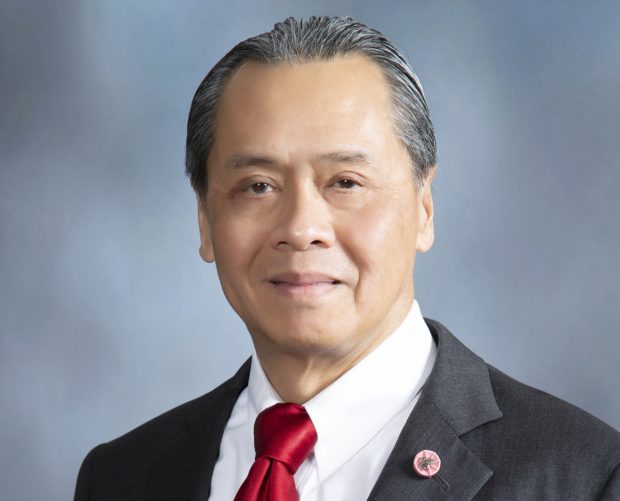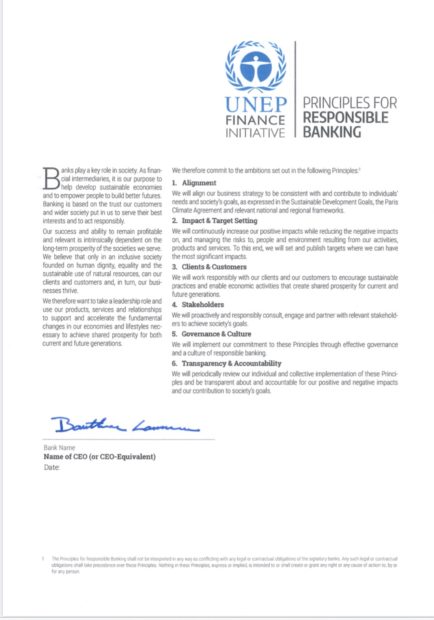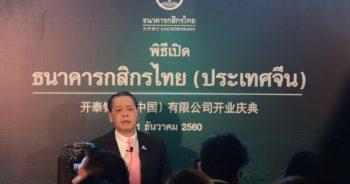
กสิกรไทยธนาคารสัญชาติไทยแห่งแรกและแห่งเดียวที่ร่วมรับใน “หลักการธนาคารที่รับผิดชอบ” (UN Principles for Responsible Banking)
ธนาคารกสิกรไทยตอกย้ำความมุ่งมั่นในการขับเคลื่อนธุรกิจบนรากฐานของการเป็นธนาคารแห่งความยั่งยืน ได้เข้าร่วมลงนามรับใน “หลักการธนาคารที่รับผิดชอบ” ของสำนักงานโครงการสิ่งแวดล้อมแห่งสหประชาชาติว่าด้วยข้อริเริ่มด้านการเงิน หรือ UNEP FI เป็นธนาคารสัญชาติไทยแห่งแรกและแห่งเดียวในธนาคารกว่า 170 แห่งทั่วโลกที่เข้าร่วมในหลักการดังกล่าว เพื่อพัฒนาการดำเนินงานของธนาคารตามมาตรฐานสากล และกำหนดกลยุทธ์ให้สอดคล้องกับเป้าหมายการพัฒนาที่ยั่งยืนขององค์การสหประชาชาติและข้อตกลงปารีสว่าด้วยการเปลี่ยนแปลงสภาพภูมิอากาศ
นายบัณฑูร ล่ำซำ ประธานกรรมการและประธานเจ้าหน้าที่บริหาร ธนาคารกสิกรไทย เปิดเผยว่า ธนาคารกสิกรไทยดำเนินธุรกิจบนรากฐานของการเป็นธนาคารแห่งความยั่งยืน ภายใต้หลักการกำกับดูแลกิจการที่ดี การบริหารความเสี่ยงและการบริหารจัดการต้นทุนที่เหมาะสม เพื่อสร้างความสมดุลทั้ง 3 มิติ ได้แก่ เศรษฐกิจ สังคม และสิ่งแวดล้อม อีกทั้งสร้างความยั่งยืนแก่ผู้มีส่วนได้เสียทุกฝ่าย และสอดคล้องตามเป้าหมายการพัฒนาที่ยั่งยืนขององค์การสหประชาชาติ
ธนาคารตระหนักถึงบทบาทสำคัญในการเป็นสื่อกลางด้านการเงินให้คนในสังคม เพื่อส่งเสริมและสนับสนุนการสร้างความมั่นคงและคุณภาพชีวิตที่ดีขึ้น เคารพในสิทธิมนุษยชนและความเท่าเทียม ดูแลรักษาทรัพยากรธรรมชาติและลดผลกระทบจากการเปลี่ยนแปลงสภาพภูมิอากาศ เพื่อให้ลูกค้าและธนาคารเติบโตไปพร้อมกันอย่างยั่งยืน ดังนั้น เพื่อประกาศเจตนารมย์ถึงความมุ่งมั่นของธนาคารในการขับเคลื่อนธุรกิจในทิศทางดังกล่าวและพัฒนาอย่างยั่งยืนตามมาตรฐานสากล ธนาคารกสิกรไทยจึงได้ตอบรับเข้าร่วมใน “หลักการธนาคารที่รับผิดชอบ” (UN Principles for Responsible Banking) ของสำนักงานโครงการสิ่งแวดล้อมแห่งสหประชาชาติว่าด้วยข้อริเริ่มด้านการเงิน (United Nations Environmental Program Finance Initiative) หรือ UNEP FI นับเป็นธนาคารสัญชาติไทยแห่งแรกและแห่งเดียวในธนาคารกว่า 170 แห่งทั่วโลกที่เข้าร่วมในหลักการดังกล่าว ซึ่งประกอบด้วยหลักการ 6 ประการ ได้แก่
- Alignment: การมียุทธศาสตร์ในการดำเนินธุรกิจสอดคล้องกับเป้าหมายการพัฒนาที่ยั่งยืนขององค์การสหประชาชาติ (Sustainable Development Goals: SDGs) Paris Agreement และหลักการที่เกี่ยวข้อง
- Impact & Target Setting: การกำหนดและเผยแพร่เป้าหมายที่ธนาคารสร้างผลกระทบอย่างมีนัยสำคัญ
- Clients & Customers: การปฏิบัติต่อลูกค้าอย่างรับผิดชอบและผลักดันให้เกิดแนวปฏิบัติที่ยั่งยืน
- Stakeholders: การมีส่วนร่วมของผู้มีส่วนได้เสียที่เกี่ยวข้อง
- Governance & Culture: การกำกับดูแลและวัฒนธรรมองค์กรสอดคล้องกับหลักการธนาคารที่รับผิดชอบ
- Transparency & Accountability: การทบทวนและเปิดเผยข้อมูลตามหลักการธนาคารที่รับผิดชอบ
ทั้งนี้ได้กำหนดนโยบาย เป้าหมาย และกระบวนการให้สินเชื่อที่คำนึงถึงผลกระทบต่อสิ่งแวดล้อม สังคม และธรรมาภิบาล (ESG Credit Policy) อย่างเป็นรูปธรรม โดยกำหนดประเภทสินเชื่อที่ธนาคารจะไม่สนับสนุน (Exclusion List) และกำหนดแนวปฏิบัติในการพิจารณาสินเชื่อสำหรับอุตสาหกรรมเฉพาะ (Sector-Specific Guideline) เพื่อให้มั่นใจว่าทุกโครงการที่ธนาคารสนับสนุนจะได้รับการจัดการผลกระทบต่อสิ่งแวดล้อมและสังคมอย่างมีประสิทธิภาพ ช่วยเสริมสร้างธุรกิจให้เติบโตอย่างมั่นคงและสร้างผลตอบแทนอย่างยั่งยืนแก่ผู้มีส่วนได้เสียทุกฝ่าย ซึ่งเป็นสิ่งที่ธนาคารดำเนินการอย่างต่อเนื่อง โดยสินเชื่อประเภท Project Finance ทุกโครงการต้องผ่านเกณฑ์การพิจารณาเครดิต ESG ทั้งหมด 100% และภายใต้ “หลักการธนาคารที่รับผิดชอบ” นี้ จะช่วยให้ธนาคารพัฒนาตามมาตรฐานสากล
นายบัญฑูร กล่าวต่อว่า ปรัชญาของการพัฒนาอย่างยั่งยืนได้ถูกปลูกฝังลงไปในดีเอ็นเอของพนักงานทุกคนเป็นกรีน ดีเอ็นเอที่ซึมซับอยู่ในทุกกระบวนการดำเนินธุรกิจ เพื่ออำนวยประโยชน์สูงสุดให้แก่ผู้มีส่วนได้เสียทุกฝ่ายและนำไปสู่การเติบโตอย่างยั่งยืน ด้วยการดำเนินธุรกิจในฐานะที่เป็นพลเมืองที่ดีของสังคม ผลักดันให้เกิดการเปลี่ยนแปลงอย่างมีความหมายต่อสังคมและสิ่งแวดล้อม รวมถึงร่วมแก้ไขปัญหาด้านการเปลี่ยนแปลงสภาพภูมิอากาศที่ส่งผลกระทบต่อความเป็นอยู่และการดำเนินธุรกิจทั้งในปัจจุบันและอนาคต โดยมุ่งประสานความร่วมมือเพื่อให้มั่นใจว่าเราจะสามารถส่งต่อโลกที่สะอาดไว้ให้กับอนุชนรุ่นหลัง ซึ่งธนาคารตั้งเป้าหมายในการลดการปล่อยก๊าซเรือนกระจกเพื่อขับเคลื่อนเปลี่ยนผ่านไปสู่สังคมคาร์บอนต่ำ และมุ่งสู่การเป็นสังคมที่ปล่อยคาร์บอนไดออกไซด์เป็นศูนย์ในระยะยาว
…
KBank becomes the first and only Thai bank to be a signatory to the UN Principles for Responsible Banking
Determined to conduct business on the foundation of a Bank of Sustainability, KASIKORNBANK (KBank) has become a signatory to the UN Principles for Responsible Banking of the United Nations Environmental Program Finance Initiative, or UNEP FI. It is the first and only Thai bank to join more than 170 banks worldwide in signing the Principles, which provide the framework for a sustainable banking system and align the banking industry with society’s goals as expressed in the UN Sustainable Development Goals and the Paris Agreement on Climate Change.
Mr. Banthoon Lamsam, KBank Chairman of the Board and Chief Executive Officer, said that KBank has conducted business on the foundation of a Bank of Sustainability, with good corporate governance principles and appropriate risk and cost management. We balance three key dimensions, namely the economy, society and environment, in order to create sustainability for all stakeholders and be consistent with the United Nations’ Sustainable Development Goals (SDGs).
KBank is aware of its role as a financial intermediary for society, aiming to promote and support rising wealth and a better quality of life, respect human rights and equality, conserve the natural environment and mitigate impacts from climate change to ensure that customers and the Bank can together achieve sustainable growth. To reinforce its commitment to conducting business with sustainable development practices on par with international standards, KBank has signed the UN Principles for Responsible Banking of UNEP FI, becoming the first and only Thai bank to join more than 170 banks worldwide to embrace the six Principles, which are as follows:
1. Alignment: We will align our business strategy to be consistent with and contribute to individuals’ needs and society’s goals, as expressed in the Sustainable Development Goals, the Paris Climate Agreement and relevant national and regional frameworks.
2. Impact & Target Setting: We will continuously increase our positive impacts while reducing the negative impacts on, and managing the risks to, people and environment resulting from our activities, products and services. To this end, we will set and publish targets where we can have the most significant impacts.
3. Clients & Customers: We will work responsibly with our clients and our customers to encourage sustainable practices and enable economic activities that create shared prosperity for current and future generations.
4. Stakeholders: We will proactively and responsibly consult, engage and partner with relevant stakeholders to achieve society’s goals.
5. Governance & Culture: We will implement our commitment to these Principles through effective governance and a culture of responsible banking.
6. Transparency & Accountability: We will periodically review our individual and collective implementation of these Principles and be transparent about and accountable for our positive and negative impacts and our contribution to society’s goals.
KBank has formulated credit policies, targets and processes that account for ESG Credit Policy in a concrete manner. We have established an exclusion list and sector-specific guidelines to ensure that all projects under our support are committed to effective management of environmental and social impacts in order to ensure their stable growth and create sustainable returns for all stakeholders. These practices have been undertaken continuously, and all project finances are required to fully pass the ESG criteria. With our commitment to the UN Principles for Responsible Banking, KBank will be able to align our business operation with international standards.
Mr. Banthoon added that the philosophy of sustainable development is instilled in all our operations as part of our Green DNA, ensuring maximum benefit for all stakeholders and paving the way for sustainable growth. KBank has conducted business as a decent citizen and has a social imperative to ignite changes that are significant to society and the environment. The issue of climate change impacts our living conditions and business operations, now and in the future. Cooperation to ensure that we can pass on a clean world to the next generations is essential. KBank has created a goal to reduce greenhouse gas emissions to do our part in the transformation to a low-carbon society, with the aim of helping to usher in a zero-carbon society in the long-term.






